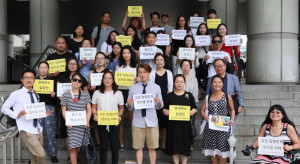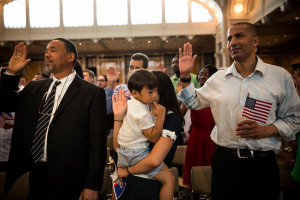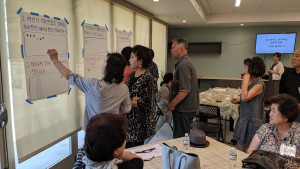News
The presiding judge in the Seoul Central District Court opened session Tuesday by noting the unusual audience as the small courtroom overflowed with over 60 South Korean-born international adoptees and adoptee rights advocates. The hearing was the first in a landmark lawsuit filed by deported Korean American adoptee Adam Crapser against the Korean government and Holt Children’s Services. In the US, groups such as Adoptees for Justice, KoRoot and the National Korean American Service & Education Consortium are mobilizing with the aim of passing a law retroactively granting citizenship to all adult international adoptees and allowing deportees like Crapser to return home.
SAN FRANCISCO — Nonprofits serving immigrant communities and advocates for racial equity, health, children, farmworkers, and working families today filed suit to block implementation of the Trump administration’s “public charge” regulation, which threatens millions of immigrant families — disproportionally families of color. La Clínica de la Raza et al. v. Trump et al., filed in the U.S. District Court for the Northern District of California, asks the court to declare the regulation issued by the U.S. Department of Homeland Security (DHS) unlawful and unconstitutional. DHS finalized the regulation on August 14, 2019.
In addition to La Clínica de la Raza, the suit was brought by African Communities Together, the California Primary Care Association, the Central American Resource Center, the Council on American Islamic Relations - California, Farmworker Justice, the Korean Resource Center, the Legal Aid Society of San Mateo County, and Maternal and Child Health Access. The plaintiffs are represented by the National Immigration Law Center, Asian Americans Advancing Justice - Los Angeles, the National Health Law Program and the Western Center on Law and Poverty.
The Trump administration announced a vast expansion of an immigration inadmissibility this week known as the “public charge.” The new rule, more than 800 pages long, creates stricter standards for applicants seeking legal permanent residency who use public benefits such as Medicaid, food stamps or housing assistance. In other words, immigration officials will look more thoroughly at the credit scores, wealth, age and educational background of immigration applicants to determine whether they are worthy of being here.
A California woman whose son needs intensive medical care says she felt "like something blew up in my face" when she learned of a Trump administration rule that would make it tougher for legal residents like her to become citizens if they access the very services her son is eligible for — such as Medicaid. Immigrants seeking to change their legal immigration status and who are enrolled in publicly funded programs such as food stamps and public health insurance could be deemed a “public charge” under the new rule starting on Oct. 15. Officials use the term to define someone who they consider may be likely to need public assistance in the future.
No brand in California politics has ever had the staying power of Proposition 13, the 1978 tax cut that served as a primal scream from angry voters and became a symbol of their reluctance to pay more money for more government services. But four decades later, it is critics of the landmark ballot measure who are angry. Their demand to downsize Proposition 13 by excluding most commercial property from the law’s strict tax limits is all but certain to win a spot on the November 2020 ballot, an epic campaign clash that could alter California’s political landscape for years to come.
It wasn’t that long ago that racism carried decisive political cost for Republicans. Back in 2012, Ken Cuccinelli, then the attorney general of Virginia, did an interview with a conservative show called The Morning Majority and spoke of immigrants in a manner many considered to be a comparison to vermin. “It is worse than our immigration policy,” he said of Washington, D.C.’s pest control standards. “You can’t break up rat families. Or raccoons, and all the rest, and you can’t even kill ‘em.”
The ‘public charge’ rule runs counter to the whole spirit of our country.
President Trump arrives to speak at a factory in Monaca, Pa., on Tuesday. His administration announced new rules this week that would prevent immigrants who access some public benefits from becoming permanent residents. (Susan Walsh/AP)
KRC organizes a group of Korean American seniors (previously known as Community Health Promoters) who meet monthly to learn about community issues, take action, and bring change to the community. In August, we will learn about how KRC operates financially and our long-standing tradition of community-powered fundraising.
The Trump administration is moving forward with regulations that are expected to dramatically reshape the U.S. immigration system by denying green cards and visas to immigrants who use — or are expected to use — a wide range of federal, state and local government benefits, including food stamps, housing vouchers and Medicaid. The final version of the "public charge" rule, which has been a top priority for immigration hard-liners in the White House, is set to be published in the Federal Register on Wednesday.
The rule is set to take effect in 60 days but is expected to draw legal challenges from immigrant-rights groups and others.
Today, the Trump Administration announced its final changes to the public charge rule, which will be published on August 14, and go into effect 60 days later, on October 14. Because of the time it will take to implement, we urge people not to immediately suspend their government benefits; this policy will not apply to applicants retroactively.









